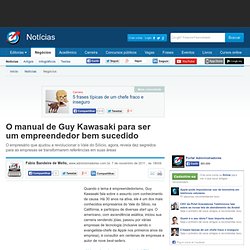

O manual de Guy Kawasaki para ser um empreendedor bem sucedido. Quando o tema é empreendedorismo, Guy Kawasaki fala sobre o assunto com conhecimento de causa.

Há 30 anos na ativa, ele é um dos mais conhecidos empresários do Vale do Silício, na Califórnia, e participou de diversas start ups. O americano, com ascendência asiática, iniciou sua carreira vendendo jóias, passou por várias empresas de tecnologia (inclusive sendo o evangelista-chefe da Apple nos primeiros anos da empresa), é consultor em centenas de empresas e autor de nove best-sellers. - Veja aqui a cobertura completa da HSM ExpoManagement 2011 Em sua apresentação na ExpoManagement 2011, realizada em São Paulo, Guy Kawasaki falou mais detalhes de como conseguir encantar clientes e o que realmente é necessário para transformar ideias em ação em 10 passos. 1 - Você deve criar significado no mundoPara Guy, as empresas que visam somente o lucro financeiro são aquelas que geralmente fracassam.
Ser inteligente – o produto deve trazer soluções para um problema. 6. 7. The Future of Mobile Payments [INFOGRAPHIC] We know that mobile payments are redefining commerce, but will our phones soon replace our wallets?
![The Future of Mobile Payments [INFOGRAPHIC]](http://cdn.pearltrees.com/s/pic/th/future-payments-infographic-13310604)
PayPal seems to think so. The payments giant boldly predicts that the wallet will be dead by 2015. It's putting its money where its mouth is: It recently acquired mobile payments provider Zong for $240 million. PayPal isn't the only one getting into the game though. Google recently launched Google Wallet, the search giant's mobile payment system, and Visa recently made a strategic investment in Square, the mobile payments platform now worth more than $1.4 billion. Professional community service G+ decided to look deeper into mobile payment trends and created an infographic that tracks what experts and analysts believe will happen to mobile commerce in the next four years, including what will happen with near field communication (NFC). Are You a Collaborative Leader? Six Rules For Networking at Work. Better Time Management Is Not the Answer - Linda Hill & Kent Lineback. By Linda Hill & Kent Lineback | 9:47 AM March 15, 2011 Managers tell us all the time they have “a time management problem.”

Their days, they say, are often hijacked by unplanned events, interruptions, crises — matters that can’t be ignored. They go to work planning to do certain things as a boss and at day’s end they realize they’ve done none of it. “How do I cope?” They want to know. Does this sound familiar? The answer isn’t what you probably expect or hope to hear. The reality is, management is fragmented and reactive by nature. Great bosses have discovered the right approach. The Right Response Is Not Always Instant - Ron Ashkenas. By Ron Ashkenas | 1:30 PM April 19, 2011 A few months ago, a former client called me in a panic: Her CFO wanted to start several process simplification projects immediately — and she needed a proposal to review with him the next day.

Straight away a colleague and I dropped everything and scrambled to meet her request: We pulled together a set of talking points and backup material that she could use and got it to her that evening. The next day we identified resources from our firm that could help, assuming that this work would get started right away. We then waited to hear from our client about next steps — and continued to wait. After almost a month of not hearing anything — despite sending repeated emails and voice messages — the client called to say that her CFO was preoccupied with closing an acquisition and getting ready for the end of the fiscal year, so the streamlining work would be deferred. Managing Yourself: Extreme Productivity. Bob Pozen does a lot.

He’s been a top executive at two mutual fund giants, Fidelity and MFS Investment Management. He’s also been an attorney, a government official, a law school professor, a business school professor, and a prolific author. And he has often been several of those things at once. Yet Pozen never comes across as overwhelmed, frazzled, or even all that busy. We know this because he’s a frequent contributor to HBR and hbr.org—with a reputation around our offices for writing faster than we can edit. Principle 1: Know Your Comparative Advantage Many CEOs I’ve encountered say, “Here are the top five priorities for the company. The correct question is, “Which functions can only you as the CEO perform?” The Success Equation - Nilofer Merchant. Human stuff — the soft stuff — is rarely valued.

We talk about it, sure. But we don’t change it. We don’t reinvent it. Why a Great Individual Is Better Than a Good Team - Jeff Stibel. By Jeff Stibel | 2:28 PM June 27, 2011 Anytime a CEO, quarterback, engineer or author is paid ridiculous amounts of money, dozens of investors, armchair quarterbacks, and scholars jump in to debate the value of individual contributors versus teams.

Bill Taylor wrote the most recent of many interesting pieces, where he argued provocatively that “great people are overrated,” in response to Facebook CEO Mark Zuckerberg’s comment that a great engineer is worth 100 average engineers. I have heard plenty of people argue that no one individual is worth the price of many.